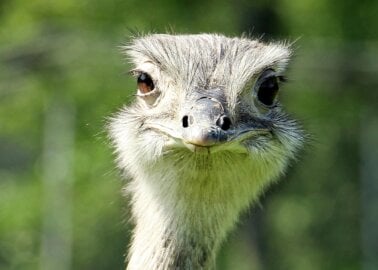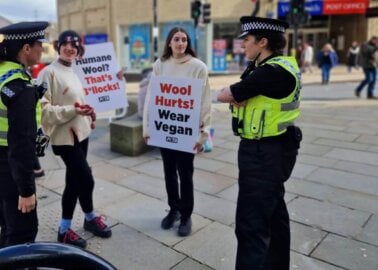7 Tips for Spring-Cleaning Your Wardrobe
Do you have skeletons in the closet? Perhaps not literally – but could your wardrobe be harbouring some uncomfortable secrets, such as items for which an animal suffered or was killed to produce?
Now is the perfect moment to purge your wardrobe of anything made from animals so that you can face spring with a clear conscience – and plenty of closet space to fill up with fabulous vegan clothes!
So grab a bin liner, roll up your sleeves and consign anything that contains these outmoded materials to the “rejected” pile.
Fur

This is a real no-brainer. Wearing fur has become a byword for callousness – think Cruella de Vil. If you’ve got any embarrassing fur relics lingering at the back of your closet, PETA will happily take them off your hands and put them to good use (for example, as bedding for rescued animals), while ensuring that they never end up back on the market.
Exotic Skins  Snakes, lizards and crocodiles need their skins a damn sight more than anyone needs a snakeskin bag or shoes. Cold-blooded animals suffer just as much as mammals do when they are skinned while still alive by hunters and farmers. They are often killed in disturbingly gruesome ways, such as by being beheaded with a machete, bludgeoned to death, or nailed to a tree and having their skin slowly peeled off.
Snakes, lizards and crocodiles need their skins a damn sight more than anyone needs a snakeskin bag or shoes. Cold-blooded animals suffer just as much as mammals do when they are skinned while still alive by hunters and farmers. They are often killed in disturbingly gruesome ways, such as by being beheaded with a machete, bludgeoned to death, or nailed to a tree and having their skin slowly peeled off.
Leather  Cow skin is not “in” this season – or any other. The leather industry is almost as toxic to the environment as it is to the cows who are killed for their hides. Tanneries discharge massive amounts of heavy-duty chemicals into their surroundings, causing pollution and illness in countries such as India and Bangladesh. You’re better off buying shoes and bags made from eco-friendly and humane synthetic fibres – they make a better statement than wearing the chemical-doused skin of a slaughtered animal.
Cow skin is not “in” this season – or any other. The leather industry is almost as toxic to the environment as it is to the cows who are killed for their hides. Tanneries discharge massive amounts of heavy-duty chemicals into their surroundings, causing pollution and illness in countries such as India and Bangladesh. You’re better off buying shoes and bags made from eco-friendly and humane synthetic fibres – they make a better statement than wearing the chemical-doused skin of a slaughtered animal.
Angora

Keep bunnies in mind as you ditch the fluffy stuff. Angora wool usually comes from China, where rabbits are kept in barren cages and often have their fur torn from their skin as they scream in pain or else are tied up, manhandled and sheared. Following our exposure of these practices, it’s become unacceptable for responsible retailers to sell angora – and for compassionate people to wear it.
Down  Feathers don’t grow on trees – they grow on the bodies of ducks and geese and are often violently ripped out for human use. If you’re allergic to cruelty, make sure that your bedding (and your bomber jackets) contain only synthetic stuffing. And for sheltering from April showers, high-tech fabrics such as ThermoBall™ will keep you snug much better than soggy feathers will.
Feathers don’t grow on trees – they grow on the bodies of ducks and geese and are often violently ripped out for human use. If you’re allergic to cruelty, make sure that your bedding (and your bomber jackets) contain only synthetic stuffing. And for sheltering from April showers, high-tech fabrics such as ThermoBall™ will keep you snug much better than soggy feathers will.
Wool 
Lamb image: Patty Marlk / ALV.org.au

All gone? Now you’re ready to treat yourself to some chic vegan fashion items! Fur-free Topshop and ASOS could be a good place to start. Go fancy with leather-free Stella McCartney or vegetarian Vivienne Westwood or splash out on boutique vegan brands such as Beyond Skin. Check out our Vegan Fashion Awards for more inspiration.



